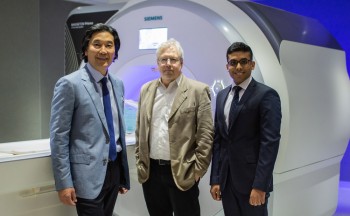Ph.D. - Psychology
Georgia Institute of Technology - 1994

Bart Rypma
Meadows Foundation Chair in Behavioral Brain Sciences
Professor
Research Interests: The cognitive and neurobiological mechanisms of human memory and experimental methodology of functional magnetic resonance aging
972-883-3235
JO 3.202
NeuroPsychometric Research (NPR) Laboratory
NPR Lab Facebook
Endowed Profile
Curriculum Vitae
Professional Preparation
M.A. - Psychology
Duke University - 1989
Duke University - 1989
B.A. - Psychology
New York University - 1983
New York University - 1983
Publications
Shokri-Kojori, E., Motes, M., Rypma, B. and Krawczyk, D. (2012). The network architecture of cortical processing in visuo-spatial reasoning. Nature Scientific Reports, 2, 411. 2012 - Publication
Bennett, I.J., Motes, M.A., Rao, N.K. and Rypma, B. (2012). Relationships between white matter integrity and visual search in healthy aging. Neurobiology of Aging, 33, 433.e21-e31. 2012 - Publication
Hutchison, J.L., Hubbard, T.L., Ferrandino, B., Brigante, R., Wright, J.M. and Rypma, B. (2012). Auditory memory distortion for spoken prose. Journal of Experimental Psychology: Learning, Memory and Cognition, in press. 2012 - Publication
Kannurpatti, S.S., Rypma, B. and Biswal, B.B. (2012). Prediction of task-related BOLD fMRI with amplitude signatures of resting-state fMRI. Frontiers in Systems Neuroscience, 6:7. 2012 - Publication
Hutchison, J.L., Lu, H. and Rypma, B. (2012). Neural mechanisms of age-related slowing: The CBF/CMRO2 ratio mediates age-differences in BOLD signal and human performance. Cerebral Cortex, in press. 2012 - Publication
Di, X., Kannurpatti, S.S., Rypma, B. and Biswal, B.B. (2012). Calibrating BOLD fMRI activation with neurovascular and anatomical constraints. Cerebral Cortex, in press. 2012 - Publication
Kannurpatti, S.S., Motes, M.A., Rypma, B. and Biswal, B.B. (2011). Non-neural BOLD variability in block and event-related paradigms. Magnetic Resonance Imaging, 29, 140-146. 2011 - Publication
Motes, M.A., Biswal, B.B. and Rypma, B. (2011). Age-dependent relationships between prefrontal cortex activation and processing speed. Cognitive Neuroscience, 2, 1-10. 2011 - Publication
Appointments
Associate Professor
The University of Texas at Dallas [2006–Present]
The University of Texas at Dallas [2006–Present]
Associate Professor
University of Texas-Southwestern Medical Center [2006–Present]
University of Texas-Southwestern Medical Center [2006–Present]
Assistant Professor
Rutgers University [2001–2006]
Rutgers University [2001–2006]
Clinical Assistant Professor
University of Medicine and Dentistry of New Jersey [2001–2006]
University of Medicine and Dentistry of New Jersey [2001–2006]
Associate Research Scientist
University of California-Berkeley [2000–2001]
University of California-Berkeley [2000–2001]
Postdoctoral Research Fellow
University of Pennsylvania [1997–2000]
University of Pennsylvania [1997–2000]
NRSA Postdoctoral Research Fellow
Stanford University [1994–1997]
Stanford University [1994–1997]
Research Assistant
Georgia Institute of Technology [1989–1994]
Georgia Institute of Technology [1989–1994]
Research Assistant
Duke University [1989–1989]
Duke University [1989–1989]
Research Associate
New York University Medical Center [1987–1987]
New York University Medical Center [1987–1987]
Projects
Isolating neural mechanisms of age-related cognitive change using fMRI.
1999–1999 Rypma, B. (1999). Psychology Dept. Colloquium, University of Delaware, Newark, DE.Studies of working memory processes using fMRI.
1999–1999 Rypma, B. (1999). Psychology Department Colloquium, University of Aberdeen, Aberdeen, Scotland.FMRI studies of human working memory.
1999–1999 Rypma, B. (1999). Universitatsklinikum Ulm, University of Ulm, Ulm, Germany.Neural correlates of human working memory: FMRI studies.
1999–1999 Rypma, B. (1999). Psychology Department Colloquium, Brooklyn College, Brooklyn, NY.Isolating the neural mechanisms of age-related changes in human working memory.
2000–2000 Rypma, B. (2000). Psychology Dept. Colloquium, University of Illinois, Urbana-Champai gn, IL.Additional Information
Professional recognitions, honors, memberships
- Busch Biomedical Sciences Research Award, 2005, Rutgers University
- Johnson & Johnson Pioneers in Science Award, 2005, Johnson & Johnson
- Siemens Award for Innovative Techr1ology Research, 2003, Siemens
- American Federation of Aging Research Award, 1999, American Federation of Aging Research
- National Research Service Award, 1994, National lnstitute on Aging
- Georgia Tech Student Foundation Award, 1991, Georgia Tech Student Foundation
- Psychology Dept. Award for Distinguished Research, 1984, New York University Psychology Dept. .
- University Honors Scholar, 1983, New York University
- Citrin Award for Outstanding Honors Thesis, 1983, New York University Psychology Dept.
- Dean's Outstanding Service Award, 1983, New York University
- Honors in Psychology, 1983, New York University
- Deans List, 1982-83, New York University
- Psychology Dept. Award for Distinguished Research, 1982, New York University Psychology Dept.
- Society for Neuroscience, 1995
- Cognitive Neuroscience Society, 1995
- American Psychological Association, 1994
- Sigma Xi (Associate), 1994
- Psi Chi, 1982
Administration and Curricular Development
- UTD/UTSW Faculty Liaison 9/06-present
- UTD Human Neuroscience Curriculum Development 12/06 - present
News Articles
UT Dallas Researcher Gets MS Society Grant
Bart Rypma of the Center for BrainHealth at The University of Texas at Dallas is one of 10 recipients who have been awarded funding from $433,800 in grants from the National Multiple Sclerosis Society.Rypma’s study uses neuroimaging methods to identify mechanisms involved in MS-related cognitive dysfunction, according to UT Dallas. The society said the 10 high-risk pilot projects are part of the year-long Pilot Research Grant program which supports early-stage research projects to quickly evaluate their effectiveness.
BrainHealth Scientists Connect Dopamine, Facial Recognition in Study
In a recent study, researchers at UT Dallas’ Center for BrainHealth, working in collaboration with colleagues in Sweden, have revealed a link between the dopamine neurotransmitter system in the brain and an individual’s ability to recognize faces.Led by Dr. Bart Rypma, Meadows Foundation Chair in the School of Behavioral and Brain Sciences, the study found that the amount of dopamine relative to the amount of brain activity in the fusiform gyrus strongly predicted the ability to recognize faces. Although the fusiform gyrus has been previously established as an area of the brain related to facial recognition, this is the first time scientists have made a connection between dopamine and facial recognition.
Study Reveals the Damaging Effects of Depression on Memory, Mind
A new study from the Center for BrainHealth at UT Dallas has found how damaging depression can be to a person’s memory and concentration.In research published in the Journal of Affective Disorders, scientists discovered that depressive thoughts stay with people with depressed moods longer than those without negative thoughts.
“People with depression or even healthy people with a depressed mood can be affected by depressive thoughts,” said Center for BrainHealth principal investigator Dr. Bart Rypma, Meadows Foundation Chair and associate professor in the School of Behavioral and Brain Sciences.
3D Brain Imaging May Improve Treatment Path for MS Patients
 A new way of looking at the brains of multiple sclerosis (MS) patients could greatly enhance doctors’ ability to select the best therapy for each person.
A new way of looking at the brains of multiple sclerosis (MS) patients could greatly enhance doctors’ ability to select the best therapy for each person.Researchers from The University of Texas at Dallas’ Center for BrainHealth have joined colleagues at UT Southwestern Medical Center to study 3D images of MS lesions in the brain, with the aim of learning to differentiate between injuries that are likely to heal and those that are not.
In a study published online May 30 in the Journal of Neuroimaging, the researchers examined 109 brain lesions from 23 MS patients using a patent-pending technique employing 3 Tesla MRI.